
ASTEROID VESTA EVIDENCE
Report 214
December 23, 2011
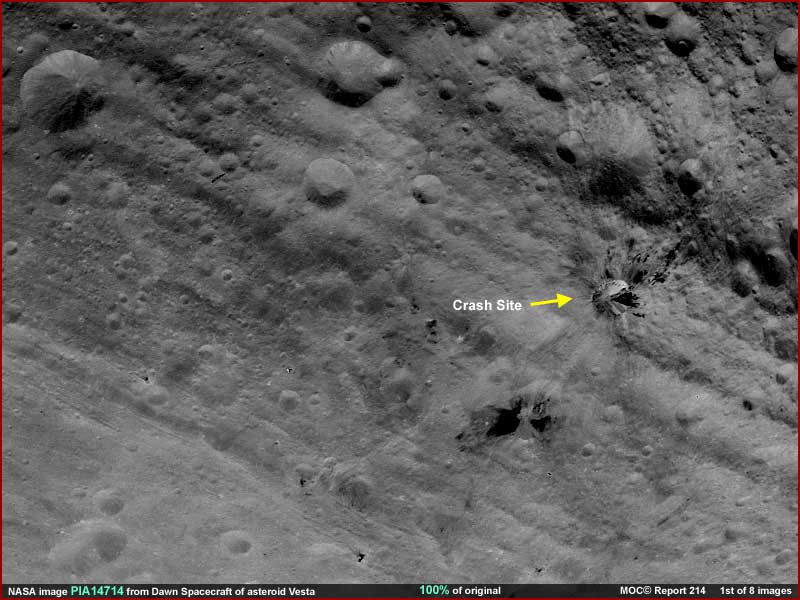
http://photojournal.jpl.nasa.gov/catalog/PIA14714
The above 1st black and white image evidence
is drawn from NASA Photojournal image PIA14714
as taken by the Dawn spacecraft of the asteroid
Vesta and posted in the NASA Photojournal on
9/16/2011. The overall Dawn mission is managed by JPL with significant contributions
by Germany. Dawn targets asteroid Vesta in 2011–2012 as the second largest
mass in the asteroid belt and Ceres in 2015 as
the largest mass in the asteroid belt by far currently classed as a dwarf
planet.
Vesta is a generally spherical asteroid about 530 km or 330 miles in diameter
compared to the dwarf planet Ceres at 950 km or 590 miles and Vesta may one
day be classed as a dwarf planet. The Dawn spacecraft went into orbit around
Vesta on 7/16/2011 for planned one year exploration and then is planned to
move on to Ceres by 2015. It is thought that Ceres may contain water on its
surface that might even support life.
The above 1st image is a context wide-angle shot. The yellow arrow points
out an object impact or crash site on Vesta. It appears to me that most of
this wide-angle scene on Vesta is hidden under a lot of wide spread smudge
treatments. That sends up a red alert flag for me. Even so, we can still see
some interesting evidence as follows.
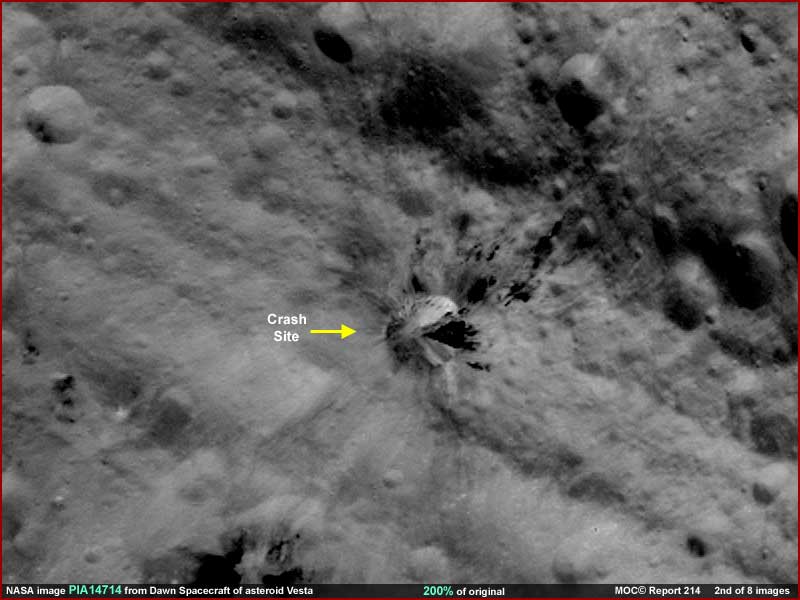
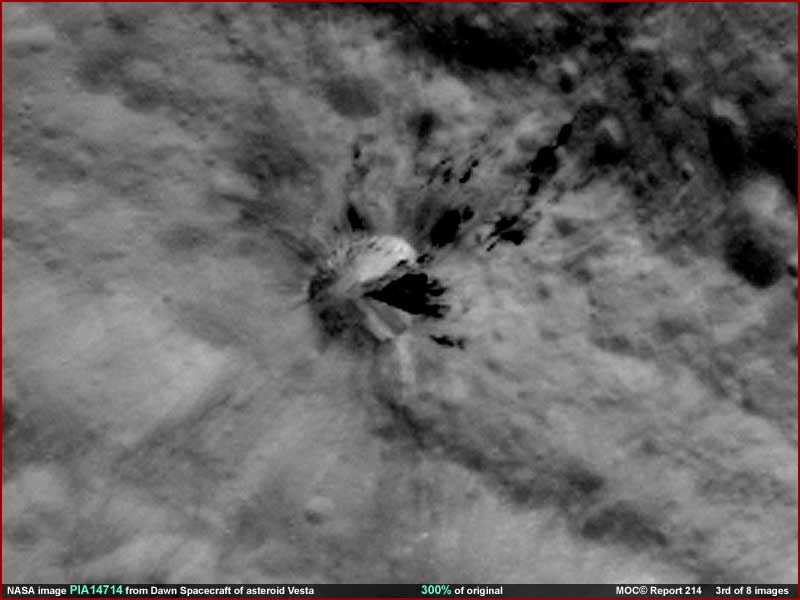
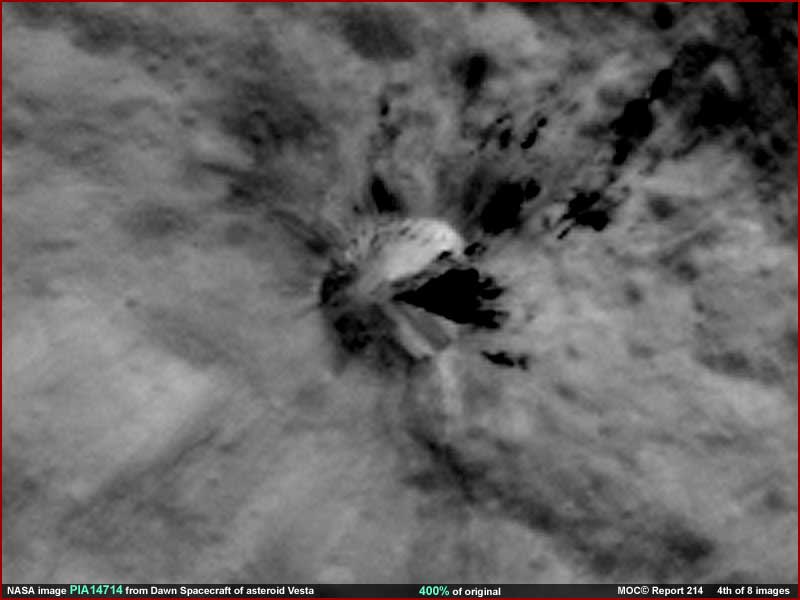
http://photojournal.jpl.nasa.gov/catalog/PIA14714
The above 2nd, 3d, and 4th images show increasingly
closer and closer views of the impact/crash site. The fluffy surrounding terrain
is in my opinion smudge image tampering coating just about everything. As
a result and as you can see, it is hard to know just what we are looking at
here? Is it a lighter color disk shaped object as it first appears in the
more distant images or a smaller wedge shaped dark object pointed into the
center of an already existing crater appearing more so in the closest 4th
image view?
Without being able to adequately examine the site or its immediate surroundings
due to the smudge treatments, it is hard to tell. However, what the smudge
can't entirely hide is that something has impacted this spot powerful enough
to throw out a telltale radial pattern of ejecta into the surrounding terrain.
It is at least interesting. On the other hand, the images below of different
evidence taken from a separate image of the same asteroid Vesta is a even
more interesting.
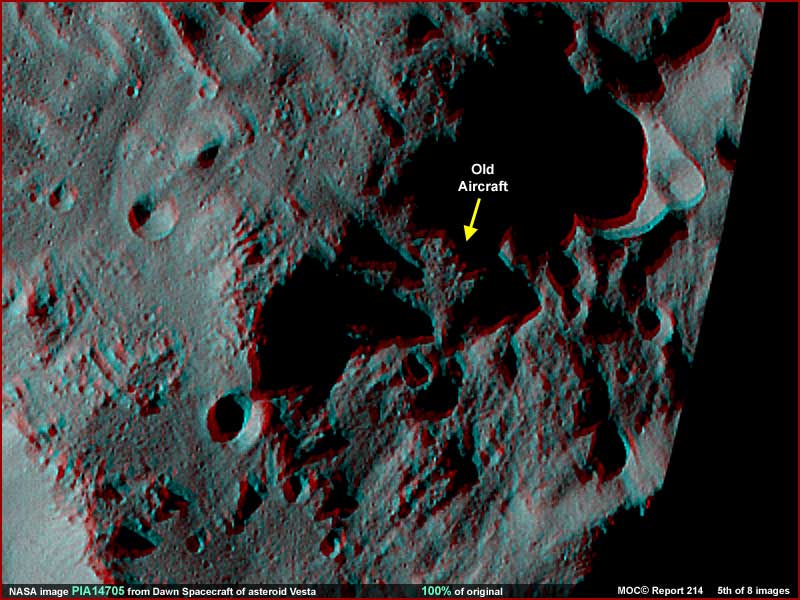
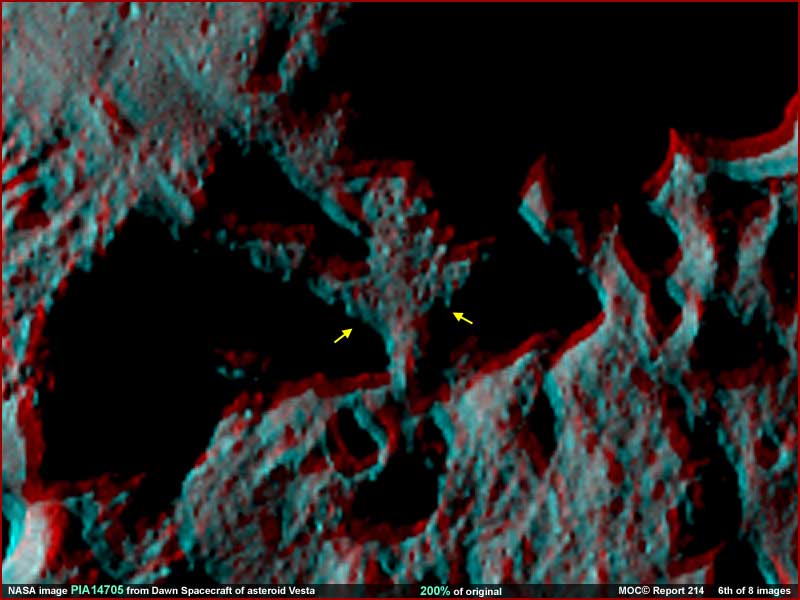
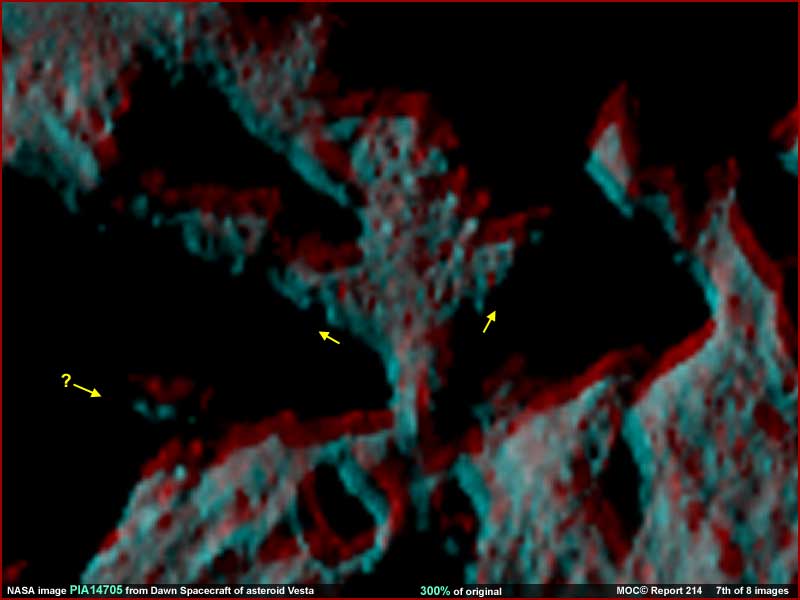
http://photojournal.jpl.nasa.gov/catalog/PIA14705
The above 5th, 6th, and 7th images taken from image
#PIA14705 again by the Dawn spacecraft of asteroid
Vesta and again posted in the NASA Photojournal on 9/16/2011 offers increasingly
closer views of what very much appears to be the skeletal remains of a winged
aircraft on Vesta. Note that it has a bombed out look to it which may likely
be due to many small meteor or asteroid debris impacts over time. Considering
the poor condition of this object and if it is an aircraft, it can be speculated
that it has been laying there for a very long time and may well be ancient.
Note that the presence of backward swept wings suggest a fast design that
is suitable for atmospheric flight and yet it is found here on the asteroid
Vesta in space in the asteroid belt. In other words, this could be a truly
ancient aircraft designed for use on some world like Earth with an atmosphere.
Could this be an object seen here on Earth by ancient civilizations that influenced
their artwork as below?
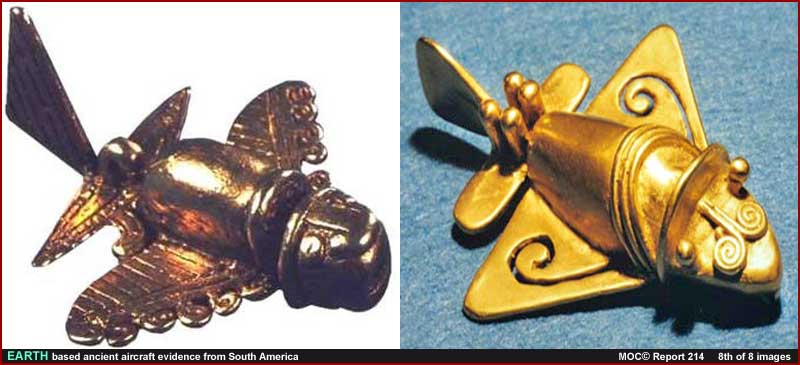
The above 8th image demonstrate just two examples
of some aircraft designs produced by ancient civilizations in Central and
South America long before there should have been knowledge of flight, at least
according to conventional thinking. Note the similarities in shapes in these
smaller more personal vehicles but demonstrating apparent similar flight design
and functions to the object on Vesta. Yes, this Vesta evidence is very suggestive
of an aircraft.
However, in all fairness, there is another consideration here. Go back up
to the 5th, 6th and 7th images and especially the 7th image. Take note of
what appears to be two glowing eyes in the darkness to the left of the object
in question pointed out by a yellow arrow and a question mark. Note that little
can be seen of anything surrounding these two glowing orbs. Are these eyes
belonging to some immense organic living creature? Could there be a serious
cooter hidden in these shadows? I draw you attention to this because I tried
to lightened this area to take a better look at this and failed.
Upon testing, it appears that this darkness around this object in question
is not true shadow as it is meant to appear but an artificial coating that
will not respond to lightening as would true shadow. That of course, once
again with the Vesta imaging, suggests image tampering likely hiding something
there. We can't know what that might be but my point is that this darkness
application may also be accidentally confining and creating the shape of the
aircraft out of the lighted terrain.
In other words, the aircraft wing shapes may be an accidental byproduct of
image tampering applied by an artificial intelligence super computer. The
AI lacking human imagination and with its likely closer views not admitted
to may know that this "object" was actually ground confined and
shaped by its applications, would typically not be concerned with a byproduct
shape it created in applying the darkness.
Note how the front edge backward angle of the "wings" extends across
the "shadow" darkness into the lighted terrain further away from
the object on both sides. The terrain there tends to align up with the wing
angle very well and this tends to confirm that the image tampering applications
are helping to create this aircraft shape with the wings.
Of course I could be wrong about this but it is all part of the visual evidence
and everything must be taken into consideration. Sorry about that but at least
you can perhaps see the complexity and how one must in fairness always try
to remain objective. Further, researchers ignore image tampering factors at
their peril. One thing is fairly certain and that is that the image tampering
is not there just for the hell of it or to tease you and I. Something else
we would visually recognize is being hidden from our view here way out on
the asteroid Vesta.
When one thinks about it, the obfuscation may itself support the speculation
that this second object is indeed an ancient aircraft. Why? Because it could
suggest that some other supporting evidence may have been hidden here.
What ever is being hidden from us there may in part
explain why someone spent so much money on the Dawn Mission to just visit
some asteroid rocks out in space. Someone may have suspected to start with
that there might be something to hide on this asteroid and was willing to
spend a lot of our resources to examine it closer along with the probably
more main and bigger target Ceres. That potential is also why I am reporting
on this rather than just closing the door on it with no reporting.
What they are hiding, you and I should be interested in. At least as long
as we don't just mindlessly swallow what ever we are officially told hook,
line and sinker or by omission not told.
, Investigator
![]()